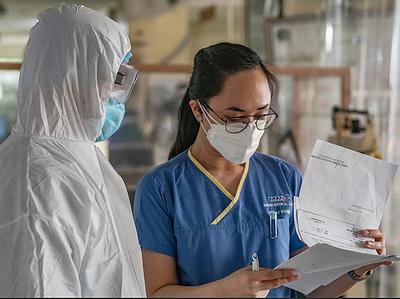
BOSTON, Massachusetts, January 23, 2022 (ENS) – A couple who gets vaccinated for COVID-19 need not worry that the vaccine will impair fertility, but males who become infected by the virus may experience short-term reduced fertility, researchers from the Boston University School of Public Health have learned.
COVID-19 vaccination in either partner does not appear to affect fertility, according to new research led by Boston University School of Public Health, BUSPH, investigators.
Published in the “American Journal of Epidemiology,” the peer-reviewed study of couples trying to conceive found no association between COVID-19 vaccination and the probability of conception per menstrual cycle in female or male partners who received the Pfizer-BioNTech, Moderna, or Johnson & Johnson vaccines.
By contrast, the findings indicate that when males are infected with COVID-19 the disease may temporarily reduce fertility – an outcome that could be avoided through vaccination.

“Many reproductive-aged individuals have cited concerns about fertility as a reason for remaining unvaccinated,” says the study’s lead author Dr. Amelia Wesselink, mom and research assistant professor of reproductive and environmental epidemiology at BUSPH.
“Our study shows for the first time that COVID-19 vaccination in either partner is unrelated to fertility among couples trying to conceive through intercourse,” Wesselink said. “Time-to-pregnancy was very similar regardless of vaccination status.”
Wesselink and colleagues analyzed survey data on COVID-19 vaccination and infection and fecundability – which is the probability of pregnancy during a single menstrual cycle – among female and male participants in the BUSPH-based Pregnancy Study Online known as PRESTO.
This ongoing study funded by the National Institutes of Health enrolls women trying to conceive and follows them from preconception until six months after delivery.
Participants included 2,126 women in the United States and Canada who provided information on sociodemographics, lifestyle, medical factors, and characteristics of their partners from December 2020 to September 2021, and the participants were followed in the study through November 2021.
Participants completed questionnaires every eight weeks on sociodemographics, lifestyle, medical factors, and partner information.
The researchers calculated the per menstrual cycle probability of conception using self-reported dates of participants’ last menstrual period, typical menstrual cycle length, and pregnancy status.
Fertility rates among female participants who received at least one dose of a vaccine were nearly identical to unvaccinated female participants.
Fecundability was also similar for male partners who had received at least one dose of a COVID-19 vaccine compared with unvaccinated male participants.
Fertility is not the same as fecundity. Fertility is the number of children born to a woman, while fecundity is her physiological potential to bear children.
Additional analyses that considered the number of vaccine doses, brand of vaccine, infertility history, occupation, and geographic region also indicated no effect of vaccination on fertility.
While COVID-19 infection was not strongly associated with fertility, men who tested positive for COVID within 60 days of a given cycle had reduced fertility compared to men who never tested positive, or men who tested positive at least 60 days prior.
This data supports previous research that has linked COVID-19 infection in men with poor sperm quality and other reproductive dysfunction.
“These data provide reassuring evidence that COVID vaccination in either partner does not affect fertility among couples trying to conceive,” says study senior author Dr. Lauren Wise, professor of epidemiology at BUSPH.
“The prospective study design, large sample size, and geographically heterogeneous study population are study strengths,” said Wise, “as was our control for many variables such as age, socioeconomic status, preexisting health conditions, occupation, and stress levels.”
A “prospective study” watches for outcomes, such as the development of a pregnancy, during the study period and relates this to other factors such as suspected risk or protective factors. This type of study usually involves taking a cohort of subjects and watching them over a long period of time.
The new data also help quell concerns about COVID-19 vaccines and fertility that arose from anecdotal reports of women experiencing menstrual cycle changes following vaccination.
Featured image: Mother, father and newborn in the first days of their family life together, December 2021 (Photo courtesy The Good Men Project)



